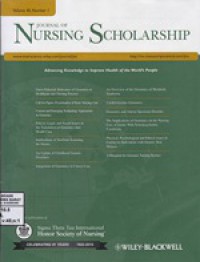
Jurnal
Effects of Motivational Interviewing Intervention on Blackouts Among College Freshmen
Purpose: Alcohol and illicit drug abuse is a serious public health issue facing college students. This study examined the impact of motivational interviewing (MI) as an intervention on the rate of blackouts among freshmen who engaged in high-risk drinking and illicit drug use. Design: A sample of 188 volunteer freshmen from a university were administered the Daily Drinking Questionnaire, the Rutgers Alcohol Problem Index, and the Government Performance and Results Act at baseline and again at 6 months postintervention. MI was applied at baseline and then again at 2 weeks, 3 months, and 6 months. Methods: Generalized estimated equations and logistic regression models were used to determine associations between the rate of blackouts and time, ethnicity, gender, illicit drug use, and alcohol consumption. Findings: At 6 months, the rate of blackouts decreased from 40% at baseline to 16% (p < .0001). The average number, time, and days of drinking and frequency of drug use also decreased significantly (p < .0001). An association between rate of blackouts and gender was observed, but not with ethnicity. Conclusions: MI had an impact on reducing alcohol consumption and the rate of blackouts among college freshmen who were engaging in high-risk drinking and illicit drug use. Clinical Relevance: The findings support the importance of using MI with freshmen college students to decrease drinking and the associated negative consequences, including blackouts, which has particular relevance for advanced practice registered nurses, physicians, and community health nurses who conduct MI as an intervention with college students.
Availability
No copy data
Detail Information
- Series Title
-
Journal of Nursing Scholarship, Volume 45, Number 3 2013
- Call Number
-
(05) 610.5 WIL j
- Publisher
- Malden : Wiley-Blackwell., 2013
- Collation
-
Hlm. 221-229
- Language
-
English
- ISBN/ISSN
-
1527-6546
- Classification
-
(05) 610.5 WIL j
- Content Type
-
-
- Media Type
-
-
- Carrier Type
-
-
- Edition
-
Volume 45, Number 3
- Subject(s)
- Specific Detail Info
-
-
- Statement of Responsibility
-
-
Other version/related
No other version available
File Attachment
Comments
You must be logged in to post a comment
 Computer Science, Information & General Works
Computer Science, Information & General Works  Philosophy & Psychology
Philosophy & Psychology  Religion
Religion  Social Sciences
Social Sciences  Language
Language  Pure Science
Pure Science  Applied Sciences
Applied Sciences  Art & Recreation
Art & Recreation  Literature
Literature  History & Geography
History & Geography